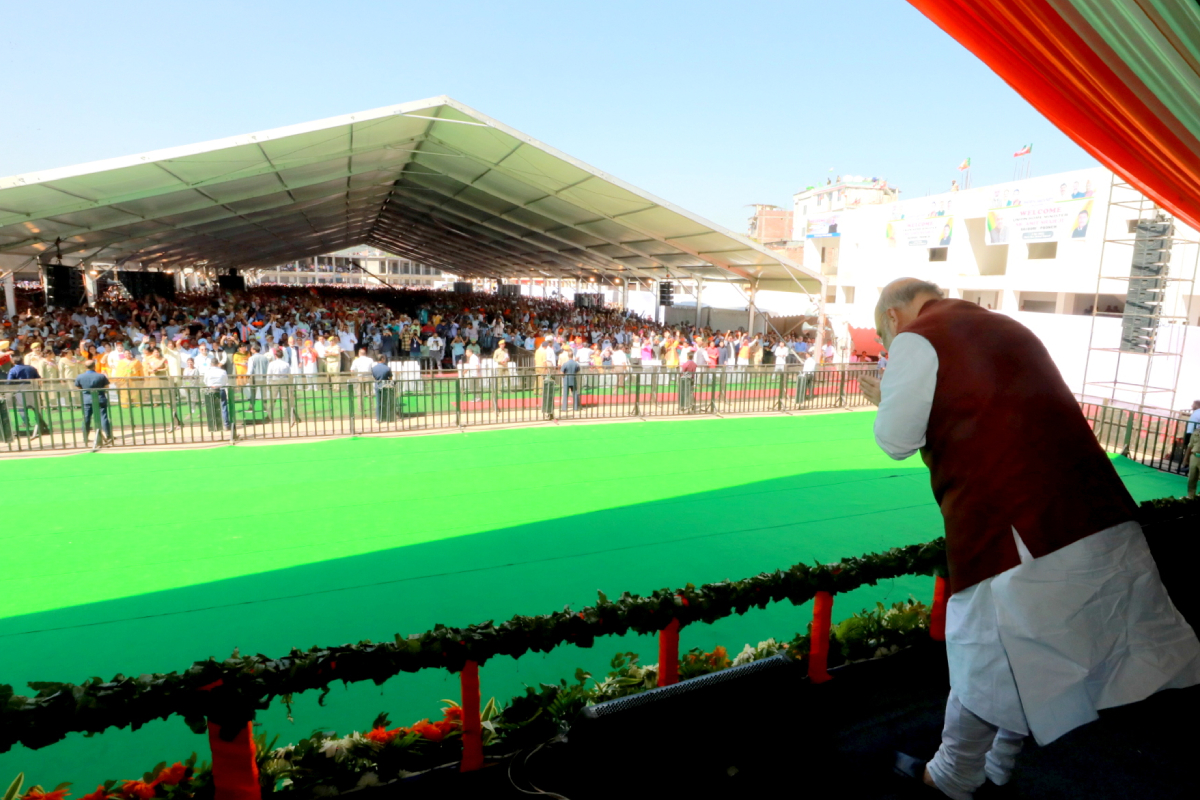On the eve of October 4, thousands of people from different parts of Pir-Panjal marched on foot towards Rajouri, where Union Home Minister Amit Shah was scheduled to hold a rally.
Around two thousand people from the Mendhar region of Poonch alone covered the journey towards Rajouri on foot. Even the frontline border villages bore a deserted look as people thronged Rajouri. This is the first time in the history of Pir-Panjal that people in such large numbers have marched on foot to attend a public rally of any Union home minister.
These enthusiastic Pahari people covered a strenuous journey of eight hours on foot to the rally in the hope that their long-pending demand for reservations in jobs and education is finally being met.
On the other side of Pir-Panjal, in the Kashmir valley, people from the twin districts of Baramulla and Kupwara were equally eager to attend the rally, which was scheduled for the next day. Post the abrogation of Article 370, these twin public rallies by the Union Home Minister are the biggest political events wherein people have attended in such large numbers.
The decision by the Central government to give reservations in education and jobs to the Pahari community, along with Gujjars and Bakkerwals, ended the decades-old demand of this marginalised community. It also opened up an opportunity for the Bharatiya Janata Party (BJP)-led central government to strengthen its foothold in the region for the upcoming assembly elections.
About 70 per cent of the total Pahari population resides in the Pir-Panjal and the rest are scattered between the twin districts of Baramulla and Kupwara in the valley. This community is a deciding factor for around thirteen electoral constituencies in Jammu and Kashmir, eight of which are in the Pir-Panjal region.
The third visit of Union Home minister Amit Shah is primarily seen as an opener towards formally signalling the upcoming assembly elections, which are probably to be held early next year.
This visit of the Union Home Minister has a marked significance. Apart from the political signalling of assembly elections, his visit also signifies the deep changes occurring within the valley since the abrogation of article 370.
The first and foremost change is that of a much-improved security scenario within the valley. His statement in Baramulla, wherein he rejected any talks with Pakistan but is willing to talk to the people of Jammu and Kashmir, is consistent with his policy of zero tolerance towards terrorism since the abrogation of Article 370. As quoted by the Home minister himself, terror-related incidents in Jammu and Kashmir have drastically reduced by 56 per cent.
After the abrogation of Article 370, Jammu and Kashmir is also witnessing the systematic dismantling of the organised terror ecosystem for the first time in the last three decades. The Jammu and Kashmir police, along with other security agencies, have come down hard by arresting and punishing people who were a part of this organised structure.
This has yielded results, as this year, the numbers of locals joining the terror outfit ranks have fallen considerably. To date, the number of local terrorists operating in the valley is lesser than those of the foreign terrorists who have infiltrated through Pakistan.
The other significant marker is the complete cessation of the stone pelting incidents which marred the valley regularly prior to 2019. This has helped the central government to bring the youth towards the mainstream.
Year on year since the abrogation of Article 370, the reduction in terror-related incidents has provided a huge breather for people to conduct their daily business uninterrupted. His remark, “From terrorism to tourism,” resonates completely. The tourism industry, which suffered the most during the turmoil, is recovering remarkably. The number of tourists visiting the valley has seen a jump of about four times. This year, a record number of more than twenty-two lakh tourists visited the valley alone.
Apart from tourism, the infrastructural projects, with other developmental and social welfare projects, have picked up the pace. The focus on building more educational institutes and providing better health benefit schemes has resulted in benefiting the local people.
Bringing in investments and providing youth with employment opportunities has been a prime focus of the Central government. The marked reduction in violence has made it possible for such initiatives to take root. Jammu and Kashmir has seen an investment inflow of ₹56,000 crores this year. The investment coupled with the new industrial policy framed by the central government for Jammu and Kashmir last year, is expected to yield positive results and majorly address the issue of unemployment.
Another important aspect has been of bringing accountability and curbing corruption within the system. This year alone, the Anti-Corruption Bureau has registered more than 110 cases against accused employees as of date. Home Minister, in his speech, had highlighted this aspect as well. The CBI enquiry ordered into the JKSSB scam for jobs highlights the fact that the government is willing to act tough against corruption.
His visit this time to the family of policeman Mudasir Sheikh, who was killed in an anti-terror operation, also adds to his distinction of being a home minister standing firm on the ground with his men. It is largely perceived as providing a healing touch to the bereaved families and is a major morale booster for the forces fighting against terrorism. Last year, he visited the family of SHO Arshad Khan, who had also lost his life fighting terrorism.
The recurring visits of the Union Home Minister to Jammu and Kashmir have helped the Central government keep an eye on the pace of development, peace and security. He has delivered exceptionally well on the security front by bringing Jammu and Kashmir into a new era of relative peace, and his successful public rallies are an indicator that he is set to deliver on the political front as well.
Raja Muneeb is a freelance columnist
Disclaimer: Views expressed above are the author’s own









